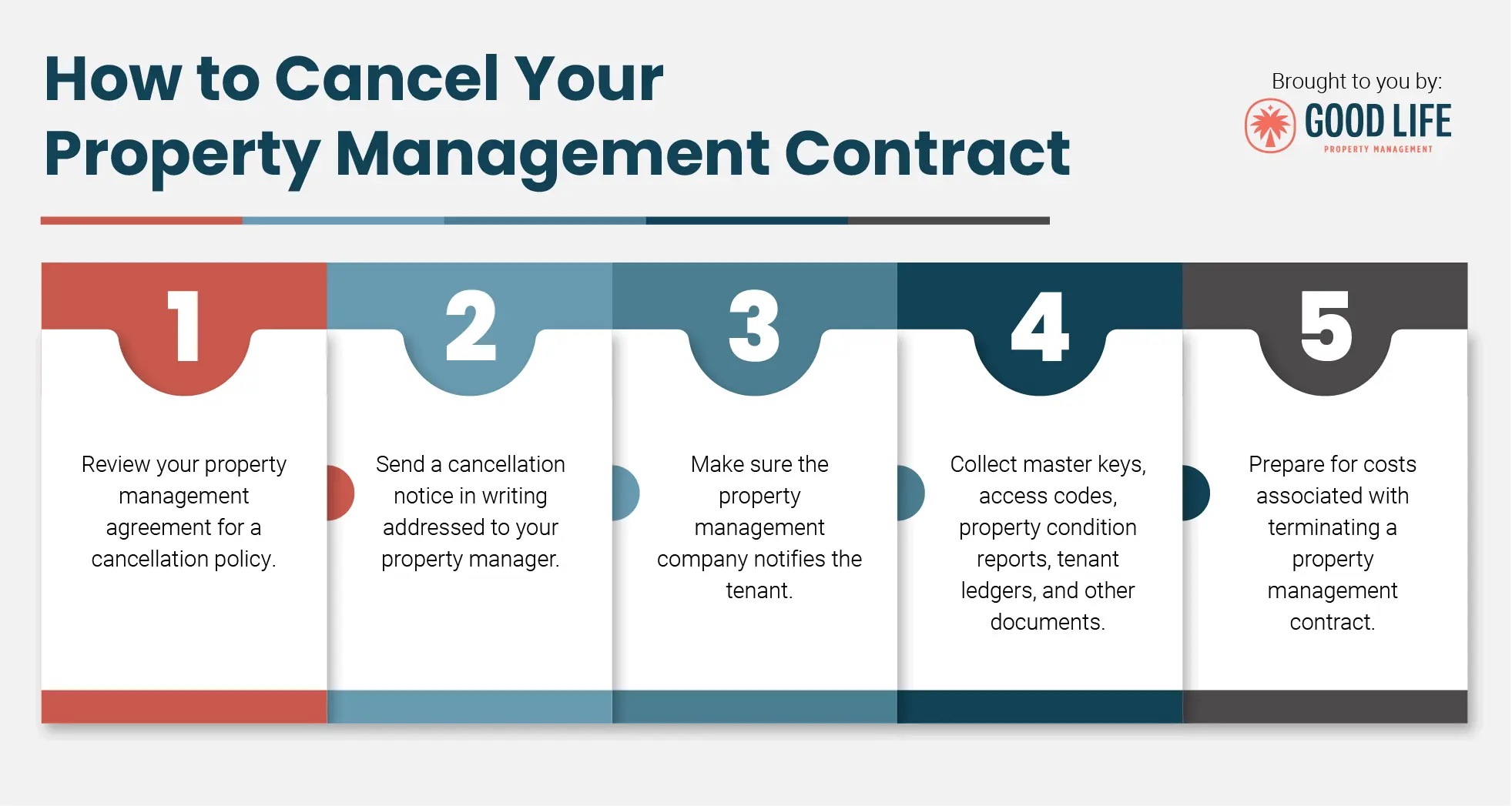How to Cancel Your Property Management Contract
2025 Update
There may come a time when you want to cancel your property management contract. These are the necessary steps to take during that process.
Terminating a property management contract is a decision that requires careful consideration and a methodical approach. In this blog post, we aim to guide you through the process of canceling your property management contract. Specifically, we will cover aspects such as understanding what a property management agreement entails, the key elements typically included in these agreements, and the legal nuances of ending such a contract. We will also provide advice on how to handle the transition smoothly and how to minimize disruptions for tenants.
Table of Contents
- Step 0: Understand the Property Management Agreement
- Step 1: Review Your Property Management Agreement for a Cancellation Policy
- Step 2: Send the Cancellation Notice through Email
- Step 3: Make Sure The Management Company Notifies The Tenant
- Step 4: Collect Necessary Documents and Materials
- Step 5: Prepare for Possible Costs Associated with Terminating a Property Management Agreement
- TIP: When to Fire a Property Management Company
Step 0: Understand the Property Management Agreement
What is a Property Management Agreement?
A property management agreement is a contract between a property owner and a property management firm that outlines how the manager will run the rental property’s daily operations. This legally binding contract serves as the cornerstone of your professional relationship with the property manager or property management company.
Within this agreement, a scope of property management services will be documented. This typically includes the specific responsibilities and duties of the management firm, how long the agreement will last, how much you will pay them, how rent will be collected and dispersed, and more. This contract will also outline responsibilities and expectations of the property owner.
The agreement also establishes clear guidelines on handling various situations that might arise during the property management process. This could include how maintenance issues will be handled, how to cancel your property management contract, etc.
Your property management agreement should be a full, all encompassing, scope of services document. If you’re wondering whether your property management firm covers a specific service, refer to the contract.
Key Elements Typically Included in a Property Management Agreement
A property management agreement typically includes, but not limited to, the following items:
- Scope of services provided by the property management company, such as tenant screening, repairs and maintenance, marketing, etc.
- Duration of agreement
- Fees and compensation
- Termination clause or cancellation policy
- How financial matters will be handled
- Legal and regulatory compliance
- Insurance requirements
- Property inspections
- Tenant relations and communication
- Owner responsibilities
Remember that your property management agreement is an all-encompassing scope of work document. In other words, all the services offered by your property manager should be included in this contract.
For further details on what to expect in a property management agreement, check out our blog: What to Look Out For in a Property Management Contract.
Now that we’ve covered what a property management agreement is, let’s look into how to cancel it.
Step 1: Review Your Property Management Agreement for a Cancellation Policy
Before you cancel your property management contract, your first step should be to review the agreement for a termination clause or cancellation policy. This section of the contract addresses the conditions and procedures you and the property management company are required to follow if you decide to cancel your agreement.
More specifically, the cancellation policy of your agreement will address the following:
- A notice period required by you or the management company to terminate your contract, i.e. a 30 or 60-day notice.
- Fees and/or penalties that might be associated with early termination of your contract.
- Responsibilities for both parties during the period leading up to ending your agreement. This is particularly important for understanding what to expect from your management company and what they will expect from you.
- A proper method of documentation for the notice. For instance, your property management will likely require that your termination notice is in writing.
Even if your property management agreement has strict cancellation guidelines and high fees to cancel, we always recommend to try negotiating better terms with your property manager. For instance, if you received poor customer service, you can request to be released from your contract with a zero dollar cancellation fee.
Check the Notice Period Requirements
Before canceling your property management agreement, be sure to identify the notice period. Typically, property managers require a 30-day or 60-day notice. The notice period should have been specified when entering the contract.
Terminating with sufficient notice will help minimize disruptions to any ongoing management tasks such as collecting rent or completing maintenance requests. This period will also allow you and the property management company to settle any payment of fees, expenses, penalties described in the cancellation policy, and/or tenant communications. Remember that your cancellation policy is legally binding, and therefore, both parties should adhere to the notice period.
Extensions and Modifications to the Termination Timeline
Things can happen quite fast and unexpectedly. If you find yourself in a scenario where accelerating the termination process of your property management contract is essential, you should openly communicate this need with your property management company. A constructive conversation may lead to an expedited termination process that aligns with your goals.
On the other hand, there may be instances where you require an extension of the contract beyond the initially agreed termination date. This could be due to unforeseen circumstances, ongoing tenant issues, or the need for more time to secure a new property management solution. In such cases, engaging in a conversation to negotiate can provide some flexibility.
In either scenario, you must ensure that any changes to your agreement are thoroughly documented. This documentation should include clear details about the new arrangements, specifically noting any revised terms, altered responsibilities, and the updated termination date. Having these details in writing will provide clarity for both parties and serve as a legal record of your new agreement.
Step 2: Send the Cancellation Notice through Email
Depending on your property management agreement, you will likely need to send your cancellation notice in writing, even if you have already spoken with your management company over the phone or in person. Remember to review your agreement so that you follow the proper protocol. Sending your notice in writing also ensures you have proper documentation of the entire process. In the next section, we will cover the steps for writing a notice to cancel your property management contract.
How to write a notice to cancel your property management contract
- First, address your written letter to the property management company and, if possible, the specific manager for your property (some companies have several managers). You want to be as specific as possible to prevent any misunderstandings.
- In the opening paragraph, you should start with a clear and concise statement of your intention to terminate your property management contract and the date on which this termination will take effect. This is also a good place to mention whether you are ending your agreement early or after the specified notice period. Include the essential details of your property or account with the property management company. Be sure to avoid any ambiguity or language that could cause confusion.
- Remain professional, express gratitude, and keep it concise. Maintaining a courteous tone of voice and remaining professional can help you maintain a good relationship with the management company during this transition period.
- Request a confirmation. To keep up with proper documentation, you can politely request a confirmation message or receipt that the management company read your cancellation notice and that they acknowledge or agree with the termination date in your letter.
- Send the letter based on the delivery method written in your agreement (certified mail or email, etc).
- Keep a copy of your letter and the delivery receipt for your records.
* Click to enlarge
Tell Them Why You're Cancelling
Whether the management company has failed to deliver on promises or you simply want to manage the home yourself, you should let the company know your reason for leaving. You’ll feel better letting them know what issues you had, if any, and they’ll appreciate your feedback.
Not sure if it’s time to leave your property manager? Check out our list of signs it might be time to find a new management company.
If you’re looking for a new property management company to manage your San Diego home, check out these 4 easy steps to make the hiring process easier!
Step 3: Make Sure The Management Company Notifies The Tenant
As you transition between management companies, it is important that all tenants at your property are informed about upcoming changes as soon as possible. Usually, the current property management company has already established a consistent communication line with the tenant(s), and should be the one to communicate these upcoming changes. Regardless of the changes, it is important that the tenants are informed in writing.
Sending proper information to the tenant(s) early can save you time from answering questions or responding to tenant emails later on.
The letter of notification to the tenant(s) should include details about who will be managing them, who they will pay their next rent payment to, the start date of the new management, and reassurance that their security deposit will be, or has been, securely transferred between management entities. To maintain transparency, requesting a copy of the notice for your records.
If you’re thinking of leaving your current property manager and are looking for a new one, check out our guide to hiring a property manager.
Step 4: Collect Necessary Documents and Materials
To ensure a seamless and efficient termination process with your property management company, collect all necessary documents and materials related to your property. Key documents and items to gather include:
- Keys to the property, including master keys, all copies, remote controls, and access codes.
- Property condition reports detailing the state of the property at the start and end of tenancies.
- Lease agreements and renewals.
- Property condition photos.
- Tenant ledger with a detailed record of all financial transactions related to the property, including rent payments, maintenance costs, and security deposits.
- Copies of tenant applications.
- Tenant contact information and renters insurance (if applicable). This will be important for maintaining communication and ensuring continued insurance coverage.
- Any HOA forms and correspondence – if your property is part of the Homeowners Association (HOA).
Being proactive in gathering these materials will help you and/or your new property manager navigate the transition process with greater ease and efficiency.
Step 5: Prepare for Possible Costs Associated with Terminating a Property Management Agreement
Now that we’ve covered how to end your property management contract, let’s discuss when you should fire a property manager, and in very rare cases, when you should report a property manager.
When to Fire a Property Management Company
Ending your contract with your property management company is a significant and sometimes scary decision. If you’re not getting the services you need, however, or if you’re dissatisfied with the company, then termination might be the right thing to do.
One of the first signs that it’s time to leave your property management company is a lack of communication. This might include consistently delayed responses to your inquiries or requests, or poor communication with the tenants.
If you notice that there is a consistent lack of communication, or lack of proactive communication before issues escalate, there might be underlying management issues that warrant termination.
Are you considering leaving your property manager? Check out our list of signs it might be time to find a new management company.
Extreme Cases - How to File a Complaint Against a Property Management Company in California
If rare and extreme cases of property management negligence, such as a breach of contract, or very poor customer service, you can file a formal complaint.
First, we recommend that you compile all your documents and records regarding your property management agreement and communication with the company, especially any correspondence about the issues at hand. Documentation can include communication records such as emails or letters, financial records, photographs or videos of property conditions, or written tenant complaints. Second, review your property management agreement for mediation clauses or dispute resolution procedures. Third, try to contact the management company directly before taking formal action. In most cases, the property management company will want to work together toward a resolution.
If a mutual resolution cannot be reached with the management company, you can file a formal complaint with the California Department of Consumer Affairs (DCA), which oversees property management licensing and regulation. In some cases, you can file a complaint with the Department of Housing and Urban Development (HUD) for complaints involving federal housing-related matters, such as fair housing, discrimination, and housing programs.
If the options above are not sufficient, you can consult legal counsel specializing in property management and real estate law in California. Their expertise can help you understand your options and rights and whether taking the management to court is in your best interest.
Hiring a New Property Management Company
If you’re ready to fire your current property manager and you’re in search for another property management company in San Diego, consider Good Life Property Management. At Good Life Property Management, we make owning rental property easy. We care about you, your property, and your tenant. And we do it all, so you can Live the Good Life. Schedule a call to learn about how we can add value to your rental property business.
If you found this article helpful, follow us on social media. We post daily tips to help you manage your own rental property:
Steve Welty
Subscribe to our Weekly Newsletter
Join the 5k+ homeowners receiving Local Law Updates and Landlord Tips. Delivered to your inbox every Saturday at 6am PST.
Share this:
Get in touch with us:
We make owning rental property easy.

Pro Services
Tired of headaches?
We got you covered.
Choose Your Next Step
Good Life Blogs
We believe that education is empowering.

SB 52: California May Ban AI Rent Pricing Tools
California’s SB 52 could ban landlords from using AI to set rent prices. Learn how this bill may impact your rental business and what actions you can take.

Trash Collection Fees Coming to San Diego Rental Properties
Trash collection fees are coming to San Diego landlords. Learn who’s affected, how much it will cost, and how to stay compliant.

How to Turn Vacant Rental Properties into Tax Deductions
Learn how to turn your rental property’s vacancy into potential tax deductions. Discover the rules, strategies, and tips landlords need to know.







